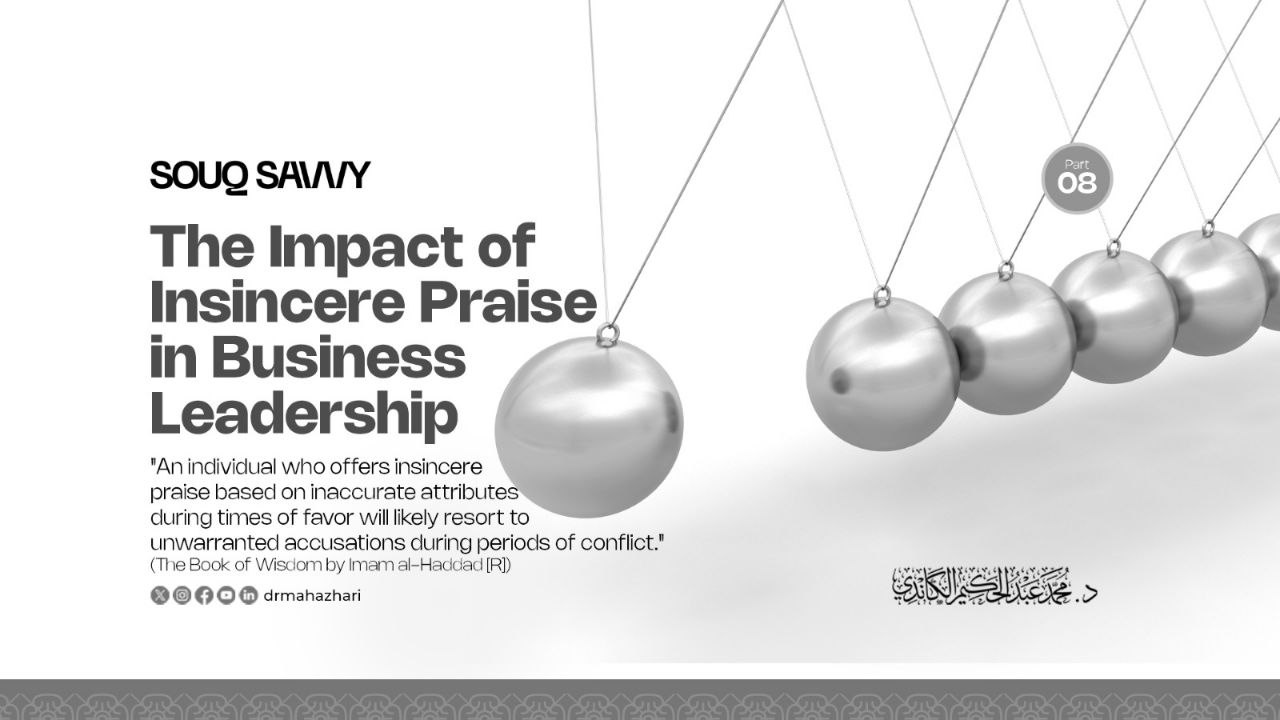Part: 10
The Impact of Insincere Praise in Business Leadership
Dr. MAH Azhari

“An individual who offers insincere praise based on inaccurate attributes during times of favor will likely resort to unwarranted accusations during periods of conflict.”
In business management, individuals who excessively praise others during periods of success—often without basis—are frequently the first to cast blame when challenges arise. Such behavior is not rooted in principle but in opportunism, which poses serious risks to trust, integrity, and long-term organizational stability. In favorable conditions, exaggerated commendations may inflate egos, suppress honest feedback, and mask underlying issues. But when situations turn unfavorable, the same individuals often become sources of division and blame, shifting narratives to protect themselves rather than serve the collective good.
From an Islamic perspective, this kind of behavior is cautioned against. Islam encourages sincerity (ikhlāṣ), honesty (ṣidq), and fairness (ʿadl) in all dealings—whether in personal life or professional settings. The Prophet Muhammad ﷺ warned against undue praise, saying: “When you see those who excessively praise others, throw dust in their faces” (Sahih Muslim). This powerful expression emphasizes that unmerited flattery can be damaging, leading to arrogance in those praised and moral compromise in those who offer it.
The Qur’an highlights the importance of speaking with truth and justice, even when it may be uncomfortable or inconvenient. The emphasis is not on pleasing others but on being upright in speech and conduct. This approach builds a foundation of trust, which is essential for strong leadership and sustainable business success.
Historical Islamic examples reflect this value. One of the companions of the Prophet ﷺ, Kaʿb ibn Mālik (RA), demonstrated true sincerity when he honestly admitted his failure to join an important expedition rather than fabricate an excuse. His honesty earned him Allah’s forgiveness and lasting respect. It’s a reminder that truth may feel costly in the short term, but it pays enduring dividends.
The principle is equally relevant in modern corporate India. There have been instances where companies experienced rapid growth and their leaders were praised extensively—often without critical evaluation of the practices behind that success. When these organizations later faced financial irregularities or major setbacks, the same voices that once celebrated their leadership quickly shifted to blame and criticism. This sudden reversal revealed that much of the earlier praise had been based on momentum and image rather than a sincere understanding of merit. When appreciation is driven by trends instead of truth, it becomes fragile and unreliable during times of crisis.
Islam encourages leaders and followers alike to anchor their actions in sincerity and accountability. The Qur’an reminds us: “They swear to you to please you, but Allah and His Messenger are more worthy that they should please them, if they are believers.” (Surah At-Tawbah 9:62). This guidance inspires us to seek ethical consistency rather than popularity or personal benefit.
In both business and faith, lasting leadership is built on truthful words and dependable character. A team or leader strengthened by genuine feedback and principled support can endure challenges and adapt with wisdom. Flattery, on the other hand, offers momentary comfort but leaves a structure hollow. Those who praise you insincerely today may fail to stand by you tomorrow. But those who speak with fairness in all seasons are the foundation of trust, and Islam teaches us to be such people—honest in our praise, steady in our support, and just in our leadership.
